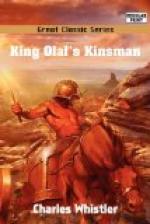Then Olaf swung our ships to either bank, and past us went in confusion, on the rush of pent-up water, the great timbers and piles of the bridge, as it broke up piece by piece in the current. The men on Ethelred’s ships had all they could do to save their vessels from being stove in by the heavier woodwork when it was swept down among them.
That danger passed; and now was our turn come to join in the fighting, for there were none to prevent us from getting the ships up to the bridge. And so we scaled from our decks the bulwarks that had been so terrible, and fell on the Danes in the rear as Eadmund in Southwark and the citizens in London took them in the front. It must have been that few Danes were left on either bank, for the fighting lasted no long time, and when we had done with these men from off the bridge there was no other attack.
So, before the evening came we knew that London was once more in the hands of Ethelred, and the bells were ringing to welcome back an English king to English land. For Olaf had brought him home.
There was high feasting in London town that night, and Ethelred deemed that England was already won. Nor was there any honour too great for him to show to the man who had wrought this for him.
But what Olaf said was this:
“To win London is much—though, indeed, it should never have been thus lost—but London is not England. There will he more fighting yet, if Cnut is a worthy son of Swein Forkbeard.”
Now, in after years men made light of this breaking of London Bridge, and the reason is not far to seek. For, first of all, Cnut’s folk, when they had the upper hand, liked not to hear thereof. And then the citizens would speak little among themselves of their thraldom to the Danes, and much of their welcome to Ethelred and their own share in the business when the bridge had been broken. And lastly, it was wrought by an outlander. Truly no Englishman, whether of Saxon or Danish kin, grudges praise to a stranger when he has won it well, but Olaf had few to speak for him after he had gone hence. But I have told what I saw, and think that it should not be forgotten, for it was a great deed. Men sing the song that Ottar the scald wrote thereon in Olaf’s Norway, and I think that they will sing it for many an age to come.
We have forgotten that song; but the first time he sang it was at the great feast in the wide hall of the London merchants’ guild that night, and sorely did the few Danish lords, who sat as captives among us unwillingly enough, scowl as they listened. But our folk held their breath lest they should lose aught of either voice or words of the singer, for they had never heard his like before, and this is part of what he sang {5}:
“Bold in the battle
Bravest in sword play!
Thou wert the breaker
Of London’s broad bridge.
Wild waxed the warfare
When thou gold wonnest
Where the shields splintered
‘Neath the stones’ crashing—
When the war byrnies broke
Beaten beneath them.




